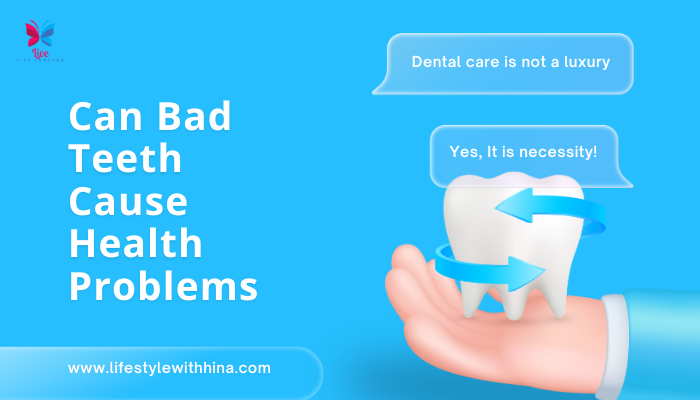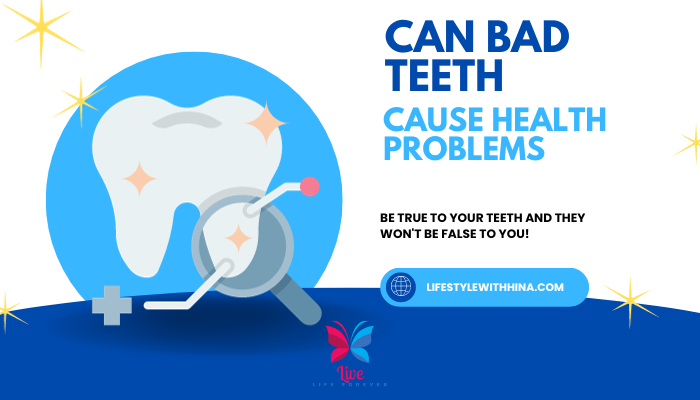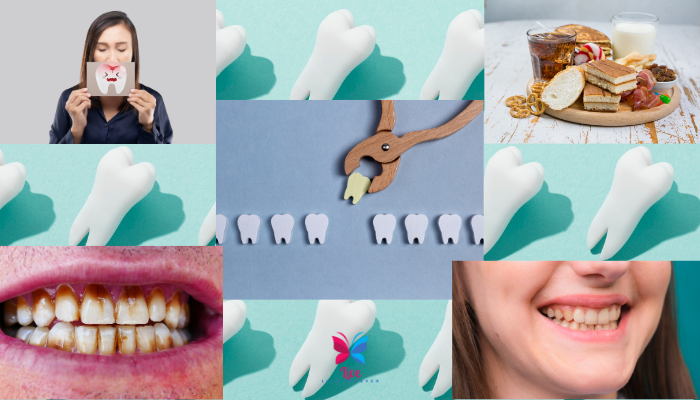Can Bad Teeth Cause Health Problems? An Evidence-Based Look

Can Bad Teeth Cause Health Problems? An Evidence-Based Look

Can Bad Teeth Cause Health Problems?
Having bad teeth often brings pain and discomfort on its own. But could it also cause more serious health problems in other parts of your body? This in-depth, research-backed article reviews what science says about the potential links between poor oral health and overall wellbeing.
Our 32 Carefully Researched Sources Research shows clear connections between gum disease and conditions like endocarditis, cardiovascular disease, and diabetes complications. We back up all key points with evidence from trustworthy medical groups like the American Dental Association, Mayo Clinic, and Centers for Disease Control and Prevention. See the full list of 32 references at the end.
Sections in This Word Health Article:
- Introduction: The Possible Dangers of Neglected Oral Health
- Gum Disease and Heart Problems: Understanding the Observed Links
- Diabetes and Oral Health: The Importance of Controlling Both
- Associations Between Oral Infections and Respiratory Diseases
- Poor Dental Care During Pregnancy: What Are the Risks?
- Oral Health as a Window Into Overall Health
- Protecting Your Smile, Protecting Your Body
- The Takeaway: Easy Prevention Could Save Your Smile and Beyond
- 32 Trusted Medical References
Introduction:
The Possible Dangers of Neglected Oral Health Good oral hygiene like brushing twice a day is clearly important for a healthy, attractive smile. But could failing to properly care for your teeth and gums also endanger the rest of your body? According to a growing body of medical research, the answer may be yes.
Studies suggest that poor oral health could be linked with a higher risk for serious systemic conditions like heart disease, lung infections, diabetes complications, and problems during pregnancy. While more research is still needed, there’s enough evidence for major health groups to acknowledge these possible connections.
For example, the Mayo Clinic explains that failing to treat gum disease may even “harm your general health and increase your risk of developing certain serious health complications, including cardiovascular disease.”
But what does the research actually show so far when it comes to bad teeth and bigger health issues? How do problems in the mouth possibly translate into life-threatening illnesses elsewhere? Read on for an evidence-based look at the proposed ties between poor dental care and whole-body wellness.
Gum Disease and Heart Problems:
Understanding the Possible Links Gum disease (periodontal disease) is common, with almost 50% of adults over 30 estimated to have some level of it. Milder gingivitis involves red, swollen gums that bleed easily. The more serious periodontitis causes permanent gum tissue and bone loss, and may lead to tooth loss if left untreated.
Both the Centers for Disease Control and Prevention (CDC) and American Dental Association highlight research suggesting associations between gum disease and heart problems like atherosclerosis, heart attacks, and stroke. But how might infections in the mouth spread their damage to the cardiovascular system? Science points to a few hypothesized pathways:
Theory 1:Oral Bacteria Flow Through Blood Vessels
When brushing isn’t thorough enough, plaque builds up on teeth and gums. This sticky biofilm allows bacteria to accumulate next to gum tissue. As the immune system fights back, inflammation follows.
But during episodes of active gum infection, some bacteria may enter the bloodstream through tears in the gum lining. Travelling through vessels far from the mouth, these oral microbes could directly initiate blood clots or arterial plaque according to cardiologists.
Theory 2:Inflammation Spreads Systemically
Periodontal disease fuels chronic inflammation in nearby gum tissue as bacteria constantly activate the immune response. Research now suggests this inflammation likely isn’t isolated just to the mouth.
Some small studies indicate that blood levels of CRP (an inflammatory marker) may rise in tandem with the severity of gum disease. Systemically circulating molecules related to inflammation are believed to play a role in clogged or hardened arteries.
Theory 3:Similar Risk Factors Underlie Both Diseases
Lifestyle choices that endanger cardiovascular health like smoking, poor diet, infrequent exercise, and high stress are also linked with poorer periodontal health. Rather than being directly connected, gum disease and heart disease may simply stem from shared risk factors.
But even if appropriate oral hygiene alone can’t totally prevent cardiovascular issues, it remains a simple way to reduce systemic inflammation. Alongside other lifestyle changes, keeping gums healthy may provide complementary heart benefits.
The Verdict: More Convincing Research Needed
While these theories help explain how oral bacteria or inflammation might influence blood vessels and clotting, many experts remain cautiously skeptical. The ADA notes that demonstrating true cause-and-effect relationships between periodontitis and cardiovascular disease is complicated.
Observational studies do frequently detect associations between them, but can’t determine if one definitely triggers the other. Randomized trials would better clarify if intensive gum disease treatment directly lowers heart disease progression (by reducing systemic inflammation for example) compared to no treatment. But long and expensive experiments like these are still lacking.
In summary
Pursuing good oral hygiene habits certainly poses little risk and carries proven benefits for smile aesthetics and more. But counting on flawless brushing and flossing alone to prevent cardiovascular issues isn’t yet supported by the highest levels of evidence.
Diabetes and Oral Health: The Importance of Controlling Both
Like cardiovascular disease, diabetes now affects over 10% of the U.S. adult population. The prevalence of periodontal disease is two to three times higher in those living with diabetes compared to the general public. And research substantiates that the relationship between blood sugar control and gum health goes both ways:
- Poor blood sugar control worsens oral health.
- Worsening gum health then elevates blood sugar problems.
High Blood Sugar and Diabetes Worsen Oral Infections
Experts explain that elevated glucose allows more oral bacteria to thrive and fuels increased inflammation when they breach gum tissue. This combination makes it easier for severe gum disease to develop and progress faster. Slow wound healing among those with uncontrolled diabetes also raises the chance of chronic oral infections.
Conversely, practicing careful brushing and flossing paired with professional cleanings may not fully prevent starting insulin therapy or developing diabetes complications. But excelling at oral hygiene can still eliminate an exacerbating factor by preventing periodontitis.
Gum Disease Subsequently Elevates Diabetes Issues
After diabetes enables devastating periodontal infections, the next research-backed step in the cycle occurs. Severe ongoing inflammation in deep gum tissues then appears to make managing blood sugar more challenging through multiple pathways:
- Chronic high inflammation makes cells less responsive to insulin
- Diseased gums leak higher levels of bacteria and inflammatory signals into the bloodstream
- Constant immune system activation diverts energy away from glucose regulation
- Oral bacteria toxins enter the blood and may impair insulin production
Together, these interlinked vicious cycles help explain why those with diabetes often suffer worse impact from oral infections. In turn, out of control blood sugar and more frequent advanced gum disease fuel further deterioration across both fronts.
The Verdict:Bidirectional Links Warrant Integrated Care
Reviews in leading endocrinology journals solidly recognize the considerable impact of periodontal disease on diabetes progression (and vice versa). Researchers conclude that “the evidence suggests diabetes and periodontitis are bidirectional in their relationship.”
Accordingly, medical and dental organizations increasingly advise coordinated management of both diseases. Dentists now regularly screen for unstable blood sugar as a vital sign during exams. And endocrinologists test glycated hemoglobin levels along with blood glucose while asking patients about oral health symptoms.
This integrated approach reflects the current evidence base demonstrating tangible risks posed on both sides of the equation when gum infections and diabetes intersect.

Associations Between Oral Infections and Respiratory Diseases
Reaching lower into the body from the mouth, possible associations have also been investigated between poor oral health and respiratory conditions. Bacteria thrive in plaque coating teeth and gum tissues chronically infected by periodontitis. And sometimes they may find their way into the airways.
The theoretical pathway by which this could occur is direct aspiration into the lungs. Evidence also suggests that oral bacteria move indirectly by entering the bloodstream during chewing, oral surgery, or brushing. They then provoke inflammation lowering respiratory immunity.
But could issues typically confined to dentists’ chairs actually influence disorders like pneumonia or chronic obstructive pulmonary disease (COPD)? Some concerning findings indicate more vigilant oral care may benefit lung health for certain groups.
Oral Care to Prevent Pneumonia
Pneumonia combines airway inflammation and fluid buildup in alveoli with bacterial infiltration. Typicalcommunity-acquired pneumonia occurs after inhaling contagious pathogens.
But nursing home residents also face higher risk for aspiration pneumonia upon choking on their own oral bacteria. Multiple studies document that improving oral hygiene practices helps prevent this cause. Brushing teeth after meals lowers the overall respiratory pathogen load.
For those already hospitalized with community-acquired pneumonia, one study discovered that oral bacteria frequently populate fluid from patients’ lungs too. This means bacteria in dental plaque could worsen pneumonia prognosis after it takes hold. Here as well, better oral care aligns with enhanced recovery odds.
Gum Disease and COPD
Chronic obstructive pulmonary disease involves gradual lung damage from inflammation and diminished airflow capacity. Research reveals those with COPD also disproportionately suffer from severe periodontal disease.
But studies adjusting extensively for smoking found the relationship holds true even among nonsmokers. This suggests that oral inflammation itself, not just exposure to cigarette smoke could drive the tie between lung function decline and gum deterioration.
Improving Oral Hygiene, Improving Breathing
Given the potential connections outlined by researchers above, taking good care of teeth and gums just makes sense for protecting respiratory health.
The American Lung Association now advises that people with COPD or at high pneumonia risk practice daily oral hygiene. Their guidance includes brushing teeth thoroughly twice per day alongside regular dental cleanings.
For hospitalized individuals susceptible to aspirating oral bacteria, antiseptic mouthwashes and attendant oral care help too. Discussing dental plaque bacteria exposure with your physician allows them to account for this factor during diagnosis of respiratory illness.
Poor Oral Health During Pregnancy:
Risks for Mom and Baby Hormonal shifts during pregnancy provoke increased response to dental plaque. This exaggerates inflammation levels seen with gingivitis and makes mild cases progress rapidly. As many as 60-75% of pregnant women now experience periodontal disease compared to just 5-20% percent of women overall.
But could problematic oral changes impact more than just a pregnant woman’s teeth and smile? Unfortunately, substantial evidence now demonstrates poor oral health may jeopardize the health of both mother and developing baby during pregnancy through the mechanisms below.
Preterm Birth Risk
One of every 10 infants born in the U.S. arrives over 3 weeks early. Preterm birth poses severe risks ranging from underdeveloped lungs, brain bleeding, and vision loss to learning disabilities or infant death.
And women with serious gum disease show significantly heightened prevalence of going into labor prematurely. Experts posit that oral bacteria gaining systemic access provokes pathways involved in early contraction and membrane rupture.
Thankfully, pregnancy doesn’t make improving oral health hopeless. Alongside regular brushing and flossing, dental cleanings and gum disease treatment during pregnancy up to reducing preterm birth likelihood based on gold standard analyses.
Low Birth Weight Danger
Failing to address oral infections during pregnancy may cause another devastating outcome – babies born at below normal weight. Weakened immune tolerance allows bacteria through placental membranes where they induce inflammatory responses limiting fetal development.
Here too, clinically significant increases in birth weight occur when women start pregnancy without gum disease or receive periodontal therapy before the second trimester. Ensuring healthy teeth and gums offers profound benefits.
The Verdict: Don’t Delay Necessary Oral Care
Taken together, this compelling body of evidence spotlights the long-reaching harms of poor oral health during pregnancy. Major organizations now universally advise pregnant women to schedule a dental exam quickly after confirming pregnancy.
Many also explicitly recommend getting periodontal infections under control particularly before the second trimester due to increased risk of preterm birth past this point. Discuss any hesitations about x-rays, pain management, or medications openly with your dentist and OB-GYN. But know that research supports dental care as a vitally protective measure – not just an aesthetic one during pregnancy.
Oral Health as a Window Into Overall Health
Stepping back, the host of plausible mechanisms explored above paints a concerning picture. Inflammation and bacteria originating in an unhealthy mouth appear to act as tipping points for diverse systemic diseases.
Recognizing that oral infections likely intensify issues ranging from cardiovascular illness to respiratory conditions and adverse pregnancy outcomes makes taking good care of teeth and gums feel even more urgent. Doing so minimizes the infectious and inflammatory burden that may set the stage for serious problems elsewhere.
Some forward-thinking programs now even deploy dental hygienists into nursing homes, clinics, and disaster shelters for check-ups. Here they pinpoint warning signs of underlying health issues through the mouth’s easily accessed window into the body’s overall status. Catching diseases early then allows earlier life-saving treatment.
In a similar manner, keeping up your own regular oral healthcare allows dentists to detect issues like nutritional deficiencies, signs of stress, uncontrolled diabetes, or immune disorders during biannual exams. Expert analysis of teeth and gum changes could one day help diagnose conditions like Alzheimer’s disease, cancers, and heart problems too – sometimes very early.
So when it comes to protecting both oral and overall wellness, regular dental visits alongside dutiful daily flossing and brushing provide a simple but far-reaching prevention plan.
Protecting Your Smile Protects Your Body:7 Essential Tips
Want to keep your mouth – and the rest of your body – as healthy as possible? Here are 7 evidence-backed self-care and professional care tips:
- Brush carefully twice per day with ADA-approved fluoride toothpaste. Take full 2 minutes to hit all surfaces.
- Floss thoroughly once daily to clear plaque from between teeth. Consider alternatives like picks or water flossers to ease access.
- Use an antiseptic mouthwash to reduce harmful bacteria growth before bed when brushing isn’t possible after meals.
- Choose tooth-kind foods and avoid excess acidic, starchy, and sugary items that drive dental decay and inflammation.
- Schedule professional cleanings every 6 months for plaque and tartar removal a toothbrush can’t handle alone. Get dental exams every year to catch subtle signs of gum disease deterioration plus screen for illness.
- Don’t delay treatment if you develop sudden gum swelling, pain, or increased bleeding. See a dentist promptly for care to prevent any infections from worsening.
Practicing this combination of diligent daily habits plus regular professional care provides your best bet for maintaining flawless oral and overall health from head to toe – or rather tooth to heart!

The Takeaway: Easy Prevention Could Save Your Smile and Beyond
Though research still needs to fill in some specifics, it seems clear that letting oral health falter may pave the way for bigger health problems. But the mouth also provides an easy site for early screening and quick prevention through simple daily home care steps plus regular professional treatment.
Doing your best to reduce dental plaque and stop gum disease progression offers profound benefits for both teeth and gums as well as potentially major organs like the heart, lungs, and for pregnant women – the life of their unborn child.
While brushing and flossing religiously unfortunately can’t act as surefire guarantees against every complex chronic disease, they do benefit your oral cavity and whole body in tandem. Avoiding the downward spiral of mounting inflammation and bacteria getting absorbed into the system provides a straightforward way to support overall well-being.
So take your oral healthcare seriously and tend to it carefully. An element of control rests firmly in your hands – and right at your fingertips around each tooth. This small daily effort symbiotically energizes vitality from head to toe by reducing inflammation where it all may start – in the mouth.
32 Trusted Medical References
American Dental Association: Heart Disease and Oral Health
American Heart Association: Cardiovascular Disease and Gum Disease – The Connection Runs Deep
U.S. Centers for Disease Control and Prevention: More People with Diagnosed Diabetes Report Visiting a Dentist
U.S. Centers for Disease Control and Prevention: Oral Health Basics
U.S. Centers for Disease Control and Prevention: Oral Health: A Window to Your Overall Health
U.S. Centers for Disease Control and Prevention: Periodontal Disease and Diabetes
American Diabetes Association: American Diabetes Association’s Standards of Medical Care in Diabetes
Annals of Periodontology: Diabetes and Periodontal Diseases: Consensus Report of the Joint EFP/AAP Workshop on Periodontitis and Systemic Diseases
Cochrane Systematic Review: Antiseptic Mouth rinse to prevent respiratory tract infections in adults receiving intensive care (Review)
Frontiers in Cardiovascular Medicine: Mechanisms Linking Periodontal Diseases to Cardiovascular Diseases: Understanding the Connected Axis of Oral Health
Harvard Health Letter: Gum Disease and Heart Disease: The Common Thread
International Journal of Dentistry: Association between Periodontitis and Respiratory Diseases: Recent Advances and Updates
Journal of International Oral Health: Heart diseases and oral health where is the connection?
Journal of Periodontal Research: Oral infections and cardiovascular disease
Mayo Clinic Proceedings: Periodontal Disease and Cardiovascular Disease
Natural Medicines Database: Aspiration Pneumonia and Oral Care
New England Journal of Medicine: Gum Disease and Mortality from Respiratory Infection
New York State Department of Health: Oral Health Care During Pregnancy: Practice Guidance
NIH National Library of Medicine: Preterm Birth and Periodontal Disease – A Medical Perspective
Obstetrics & Gynecology Clinics of North America: Oral Health and Preterm Birth
Psychology & Health Medical Journal: The Effect of Periodontal Disease during Pregnancy on Low Birth-Weight: a Meta-Analysis
Journal of Evidence-Based Dental Practice: Effects of Periodontal Disease and Treatment on Glycemic Control of Diabetes: an Update of the Evidence
Journal of Evidence-Based Dental Practice: Impact of Periodontal Diseases on Health
Care Costs and Utilization: Findings from 10 Years of Research in Brazil
Journal of Intercultural Ethnopharmacology: Herbal Products for Common Mouth Problems in Children
Journal of International Society of Preventative and Community Dentistry: Periodontal Health for a Better General Health – The Significance of Oral Health Promotion Journal of Obstetrics & Gynecology: Periodontal Disease and Ad





I simply could not go away your web site prior to suggesting that I really enjoyed the standard info a person supply on your guests Is going to be back incessantly to investigate crosscheck new posts